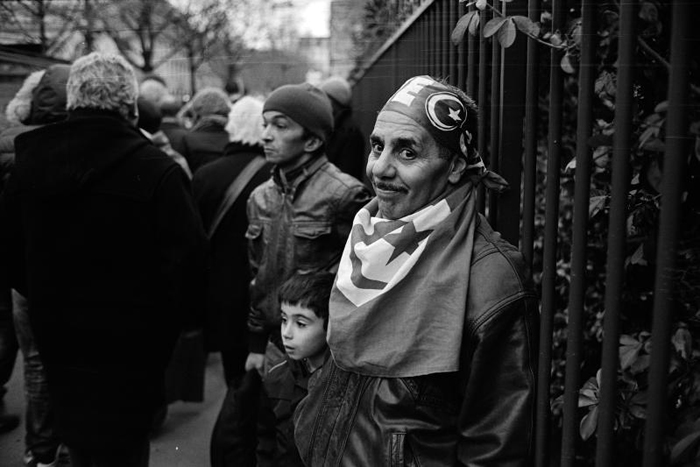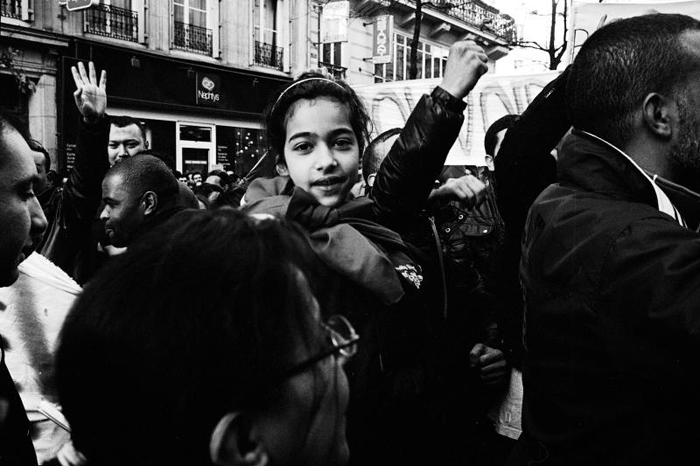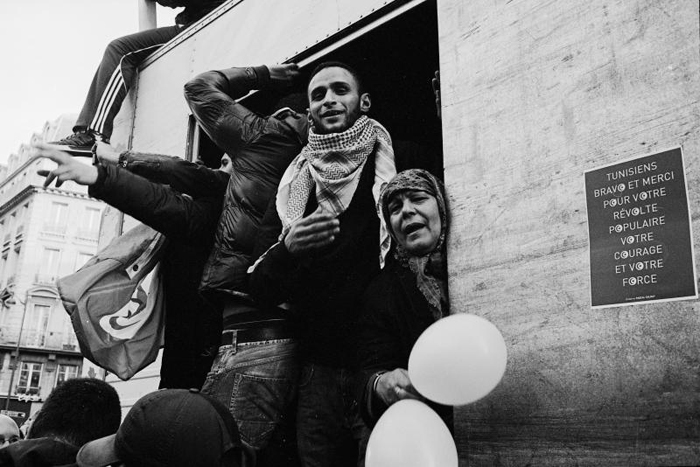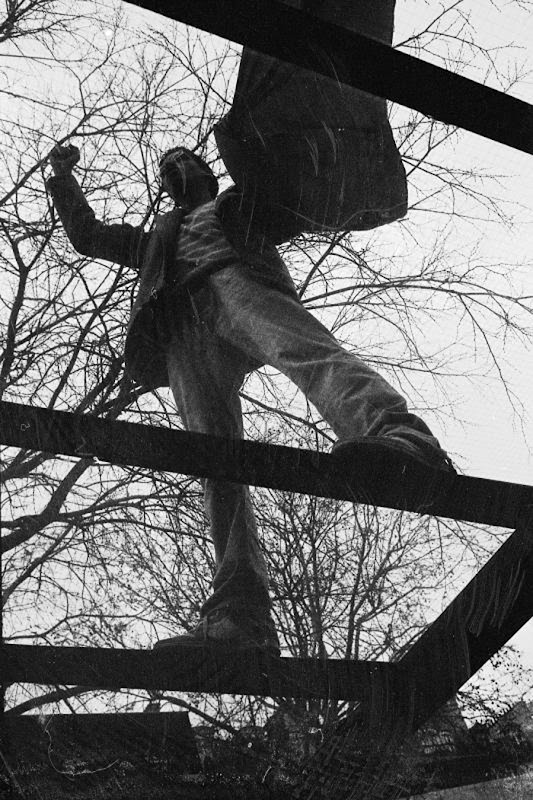
Manifestation of support for Tunisia, Paris, 01.15.2011; cliche Yann Renoult
" C that e we ask is the emergence of a true government of public hello all trends which sit in an inclusive and whose main tasks will be:
- abolish all traces of former power.
- organizing elections for a constituent assembly that will establish the beginnings of a genuinely popular power, so truly democratic. The struggle of the Tunisian people do not falter. He insists that does not rob him his "revolution". "
I bn Versus , 1432
______________________
Tunisia: French impasse
were received from various fragrances, the romance right-thinking was quick to agglomerate into a scent of jasmine is easy to sell to viewers. Carnations, velvet, orange, jasmine, saffron ... Under the banner of revolution, the meat is more or less rare, and Tunisia has gone through a winter before experiencing a dramatic democratic spring. When a people verging on civil war, when the militia and looters share the night, he should tremble before applauding. There is a Western form of obscenity to see only fun and not settle scores, to applaud the uprising without flush manipulation palace. In France particularly, the convenience of today with regard to the revolution of Jasmine is almost as dishonest as the indulgence of yesterday to the regime of Ben Ali. The Event Marketing is one thing, the reality of politics is another.
It's the same standard formula, the same caution should be applied to the urge to fire Generally, at this childish desire to see other Arab nations to play dominoes revolutionary, in a "youp the boom!" adventurous. If this happens, more people will find its way to the tyrants and resolved ruthless assassins, as the reversal rather easy "benali" corrupt and rotten can not set a precedent. Besides a series of popular uprisings would lift a terrible sandstorm geopolitics, which does not spare us. What would be our reaction: organize international brigades or condone repression?
Everything is urgently review our strategy towards the Arab world. Too long, France has tolerated and coaxed autocrats to prevent the Islamists: "Rather than bearded Ben Ali" is a slogan obsolete, we must draw another wall, whose progress and development, equality and education, will all be pillars. Dictatorship is a false antidote to Islamism, poverty, a real dope. After the colonial and postcolonial era, can open the time of true cooperation.
In recent decades, another song we have been fed, saw true since the economic crisis : it is Asia, especially China, which holds in his hands our future. Currency, industry and culture begin to yellow, resolutely. But the South still has its say! Do we shape up the economy, it may well constrain us in politics. Possible breaking of illegal immigration, in case of a disaster, the temptations of terrorism, the worst is not sure, but it should be considered. And if we are spared, if democracy begins peacefully in green and is binding on the entire Muslim world, these are people hungry for knowledge and wealth which will turn to us. To prevent boat people and suicide, listening to complaints from the South Wind and remember that it can be a breeze or a burn.
Christophe Barbier , published on 01.18.2011, on the site of the Express

Manifestation of support for Tunisia, Paris, 01.15.2011; cliche Yann Renoult
Tunisia: The telltale signs of the real objectives of the power of post Ben Ali
Since the leak of Ben Ali, the telltale signs of the real objectives of those in power have been numerous:
1 - Declaration of a temporary vacancy of power (Reliance on Section 56 instead of Article 57). We can see clearly, hope to see the power BEN ALI Back. Hope that was While short but revealing of the mindset of those in power.
2 - Divide and conquer: the militia attacks targeted the poor and deprived areas without too tough in the middle-class neighborhoods that have remained fairly quiet. Objective: To create a division between rich and poor and between regions. On the other hand, we also saw a solid and intelligent use of social networks to handle the young.
3 - The exclusion of the real opposition to this government. This is indicative of the line of power that has not changed: I am alone in power, I leave a small tip for an opposition power-hungry and nothing for real opponents.
4 - Radio Silence on the fate of relatives of Ben Ali and Trabelsi. Instead, we baratine with jewelry and pictures of burned cities and transformed into a museum. why this silence? Those who have been arrested and that there is no news, is that they were arrested for prosecution or for the protection of the people and ease their escape?!
5 - Arrest warrant against Ben Ali and his family for embezzlement. After 23 years of dictatorship, the mandate stopping only for embezzlement; we forget the torture, murder political opponents, human rights violations, victims of events killed by sniper. Note that the president of TV Hannabal it was accused of high treason! This is another telltale sign of the real goals of power: With this charge the chances of arrest and extradition of Bin Ali are practically nil, Ben Ali will run surely a quiet life, a claim will be accepted in a large number of countries (especially, of course, it comes with the embezzled funds).
6 - In the press and television has not changed, everything is always under control of the party in power. Objective: To hide the magnitude of events and marginalize the protesters. Propaganda and manipulation are still valid. The editor of the Journal on TTN is always the same Abdelmotaled Innoubli which began two months ago all these sentences with: "Al Karrar Raiis Zine El Abidine Ben Ali ...."
7 - Censorship in the media of the real opposition: PCR, PCOT, etc. which is expressed almost exclusively on foreign media, mostly, Al Arabiya and Al Jazeera.
8 - RCD practices persist: attacks by protesters, inciting violence against the protesters by offering money and drugs and this is just the tip of the iceberg.
9 - Nothing has changed in the Ministry of Interior and nothing is planned yet this is where there is a real urgency for a total purge. The assault on the demonstrators and especially on the Tunisian journalists continue. Police policy still exists and no one talks about its dissolution.
10 - Economic measures cans (unemployment benefits, compensation injuries) have been pledged to buy and calm the poorest who are today the most fiercely opposed to this government.
11 - Finally, this government does not act but reacts under pressure from the street. In addition, actions are sometimes a parade to try to calm the discontent. Another telltale sign of the lack of genuine good will of that power to make real changes. His goal: to believe that the dictatorship is over, to remain in power.
In the subsequent phase of transition, we must remain vigilant to detect through actions of this power, its real intentions, here are some examples:
1 - Pretending to cut heads (the most visible, most wet), to satisfy the desires of revenge and appease the people without that cleans because the goal is not to relinquish power to people not having the same idea of Tunisia as the RCD. A dictatorship does not self-destructs.
2 - With the imminent return of Rached Ghannouchi, it will quickly use the threat of Islamism: Caution, you've chased a dictator and that is the result, now Islamists are there! Instill fear allows for a gradual reduction of liberties.
3 - For presidential elections, we will be able to release a candidate (for example the opposition docile and eager for power) who is willing to deal with them: Power cons leniency toward corrupt the former regime. This assumption is likely and the risk of seeing the same system back with a new head is real, especially after the support ostentatious display by the Americans, to this government. The latter, are loathe to see the power in the hands of anyone anti-American and anti-Israel. Change the dictator he was, his reign to an end anyway, but keep its system loyal to the united states and Israel.
4 - discrediting the real opposition: This power will strive to discredit and harm their reputations and by all means and under the watchful eye of American and Israeli. Let us not forget that there is a community of 50,000 Tunisian Jews who sometimes nationality Israelis, Americans and Israelis will they take any risk regarding the fate and safety of this community face the Islamist threat?
5 - Manipulating Elections: Evidently, it is inconceivable that power plays the game the next election or risk losing power. It will use various means and tricks to ensure win elections without rigging yet. I quote a major risk against which the Tunisians will face: The idea will be, under the guise of democratic good intentions, regulate all political parties and encourage them to stand for presidential elections. Subsequently, this authority will exercise its monopoly of the media to confuse and divide the Tunisian around the various candidates, while encouraging, discreetly, their own candidate. The objectives of this operation are:
- Avoid an opposition candidate is acceptable to everyone.
- Divide the Tunisians to disperse the votes on the maximum possible candidates
In these circumstances, there is no majority and the winner will be the largest minority. With over 2 million members, the RCD will be tomorrow, no doubt, a very large minority, and is eligible to pass the first round of elections without a hitch.
In conclusion, it is clear that dictatorship is not yet dead and buried but seriously injured and much weakened. The Tunisian people that has brought this extraordinary stroke must finish the job. Until then, this power has been and continues to make a grave error to underestimate the stubbornness of Tunisians to end the dictatorship. I hope this error will cause his loss!
Let us fooled, do not fall into their trap and believe foremost in the public interest.
Amine Basle, 28/11/2011, on site Nawata

Demonstration of support to Tunisia, Paris, 01.15.2011; cliche Yann Renoult
Tunisia Mohamed Ghannouchi facing the silent revolt of a people
After the overthrow of the tyrant Ben Ali and the dismantlement of mafia clans, played a new balance of power: a people descended on the streets every day and shows his determination to liquidate any trace of the party facing an immovable Prime Minister Mohamed Ghannouchi, tried to illegitimacy and refusing to work under pressure with the people under the balcony. His government of "small hole" merely announcement effects and timid guarantees issued in dribs and drabs. In this, it is true that neither reflects the boldness of a people, nor its aspirations to be finally heard.
movement bogged down. Ghannouchi and his government are now run by a single obsession: to close the parenthesis of popular revolts. All decisions and public speaking converge towards this goal: three days of national mourning were decreed as protests continue, the Tunisians are commended for this "revolution" while the real RCD still exists in all strata of government and all scales. Ghannouchi cynicism grows up playing the empathy card masquerading as a Tunisian another implied wait-tractable and fatalistic. Yet one who has implemented for eleven years, the policy of Ben Ali in Tunisia is in no way comparable overqualified forced to sell prickly pears, or comparable to one who has passed away in the basement of the Ministry of Interior for his political ideas.
This eagerness to end the "national movement for freedom" is relayed to the Tunisian television. It was nice change of logo and pretend to reconnect with the freedom of expression, naturalness their spots. The latest news stories covering the events deliver a clear message: we must return to work. The newscasts depict a page of history that would turn around and freezes it forever control movement. Images go loop of fathers wishing to return to work and children relieved to find their comrades and not lose a year. Any further movement is so discredited. The betrayal of the movement and ultimate sacrifice for freedom from the dead is conspicuously seen in public by those who do not want to lose points of GDP or want to pick up the baccalaureate this year, as if their future was not played today.
It seems that these revolts should continue as they began, that is to say without coverage. Maybe she will complete and in the silence of the waves, the process of rebuilding power.
Mehdi Zorgati , 28/01/2011, on the site Nawata

Manifestation of support for Tunisia, Paris, 15/01 / 2011; cliche Yann Renoult
What a revolution for Tunisia?
By opening the doors of a story now "written on globalization," the Tunisians can trigger "inventing new structures democratic, "the invention of a new state. By Thi Minh-Hoang Ngo, historian, IRSEA (University of Provence).
By protesting against high prices and unemployment, the Tunisian people had heard his stories into force individual and collective, repressed by the history of the nation-state has built since decolonization and Tunisia's independence in 1956. Rebellions of despair, against injustice become intolerable, that the frailties of State Ben Ali and police repression have turned into acts highly political. In revolting, Tunisians, particularly the young, open history, a story written in globalization that promotes the challenge to the state in many forms, including using social networks. Revolts Tunisians, is the story of a nation without a state, a democracy that opens and it remains to be invented, surpassing the model for post-colonial western part of the globalized world of the twenty-first century, friendly and fruitful exchange of ideas.
Make revolution
Because they respond to a failed state, revolts Tunisians have a dimension revolutionary. But the revolution is not only spontaneous revolts that scares a dictator. It implies that a new state be built with the participation of civil society and people.
The Tunisian post-colonial state, embodied by the historic leader of the independence, Habib Bourguiba and Ben Ali was the result of a hybrid process of training that combined Western modernity, symbolized by the secularization of society and a political system based on clan and family. It is this hybrid state formation that have not seen the French embassies, lulled by the illusion of identity and belief in a post-colonial history that would end with Western modernity.
In China, on the eve of the advent of the communist regime, peasant revolts and the revolutionary atmosphere that followed were not sufficient to create a revolution. It took a process of state formation by the Communists, who began in the bases of resistance against Japanese Aggression (1937-1945), through mobilization, politicization and with the participation of the Chinese people, especially farmers. The Chinese Communist Party and not only had a certain legitimacy, but implanted also the state in society and in their hearts, to the excesses of Maoist agrarian collectivization. It is this historical legitimacy linked to the revolution which explains in particular the duration of the Chinese party-state today.
For Tunisia revolts lead to a better future, there is a new elite in power, able to think a revolution and the emergence of a state inventing new democratic structures, drawing on ideas from various meetings in favor of globalization, also to mitigate the effects thereof on social injustice. Tunisia mark since lasting twenty-first century by the emergence of other stories in Western history that the revolts of Tunisians have helped to questions.
Thi Minh-Hoang Ngo , on 28/01/2011 site Mediapart

Manifestation of support for Tunisia, Paris, 15 / 01/2011; cliche Yann Renoult
Tunisia: Why not a committee of public hello?
On 27 January, Mr. Ghannouchi announced the cabinet reshuffle demanded by the majority of people who demanded the departure of former collaborators of the regime of Ben Ali. While his departure was as expected, it remained at the forefront of this new training promising free elections in the coming months.
a time when the debate on changing the constitution and the choice of political system to govern the country in full swing, the government of Mr. Ghannouchi, in its current form does not allow reading of a clear policy line and defined. Maintaining the same institutions, the same structures and especially the same form of governance, this government can really claim to be democratic transition government? Do heads does not it subtly to a new government benalien? Currently
On 27 January, Mr. Ghannouchi announced the cabinet reshuffle demanded by the majority of people who demanded the departure of former collaborators of the regime of Ben Ali. While his departure was as expected, it remained at the forefront of this new training promising free elections in the coming months.
a time when the debate on changing the constitution and the choice of political system to govern the country in full swing, the government of Mr. Ghannouchi, in its current form does not allow reading of a clear policy line and defined. Maintaining the same institutions, the same structures and especially the same form of governance, this government can really claim to be democratic transition government? Do heads does not it subtly to a new government benalien? Currently
Tunisia needs political stability to be able to move confidently into the waiting Tunisians deadlines and cope with enormous challenges.
Tunisia does not see a revolt but a revolution that has swept the former regime, tearing its deepest roots. Cling to the structures of the old regime and its constitution seems totally unnecessary and anachronistic.
Today, everyone agrees that it is impossible to have presidential elections within 45 days.
At that time, the Acting Chairman and the current government, which for a large segment of the population does not currently have no legitimacy, no longer have any constitutional legitimacy.
So what?
Mebazza Mr. Ghannouchi and should exercise wisdom in withdrawing and leaving room for a public hello Committee, composed of three or four personalities known, serious and honest was not compromised with the old regime.
This committee will be responsible for public hello:
- to form a government of technocrats to run the country.
- to organize elections for a Constituent Assembly.
The election of the Assembly will take place very rapidly, ie within two months. It will consist of 50% of corporate bodies (UTICA will be represented with its various sectors, farmers, UGTT with its different sections, UNFT, lawyers, doctors, journalists, students, etc.. and 50% of the people elected by universal suffrage.
The role of this Assembly will be:
- to hold elections to choose its President
- to draft a new constitution
-A legislative role
Once elected Constituent Assembly, the committee will be dissolved hello public and the President of the Assembly shall at the same time the post of Head of the Tunisian government by interim. He will return the task to appoint a government.
Once the constitution is ready and a new electoral code will be established, then we will proceed with legislative or presidential elections according to the form of governance that the constitution will be determined.
Fatma Benmosbah , 01/29/2011's website Nawata

Protectorate treaty concluded between France and Tunisia, 12 May 1881 (extract)
0 comments:
Post a Comment